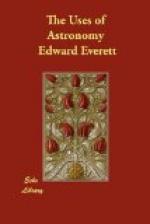forces, without a knowledge of the laws. The
true practical, therefore, is the result, or actual,
of an antecedent ideal. The ideal, full and complete,
must exist in the mind before the actual can be brought
forth according to the laws of science. Who,
then, are the truly practical men of our age?
Are they not those who are engaged most laboriously
and successfully in investigating the great laws?
Are they not those who are pressing out the boundaries
of knowledge, and conducting the mind into new and
unexplored regions, where there may yet be discovered
a California of undeveloped thought? Is not the
gentleman from Massachusetts (Professor Agassiz) the
most practical man in our country in the department
of Natural History, not because he has collected the
greatest number of specimens, but because he has laid
open to us all the laws of the animal kingdom?
Are the formulas written on the black-board by the
gentleman from Cambridge (Prof. Pierce) of no
practical value, because they cannot be read by the
uninstructed eye? A single line may contain the
elements of the motions of all the heavenly bodies;
and the eye of science, taking its stand-point at
the center of gravity of the system, will see in the
equation the harmonious revolutions of all the bodies
which circle the heavens. It is such labors and
such generalizations that have rendered his name illustrious
in the history of mathematical science. Is it
of no practical value that the Chief of the Coast Survey
(Prof. Bache), by a few characters written upon
paper, at Washington, has determined the exact time
of high and low tide in the harbor of Boston, and
can determine, by a similar process, the exact times
of high and low water at every point on the surface
of the globe? Are not these results, the highest
efforts of science, also of the greatest practical
utility? And may we not, then, conclude that
there is nothing truly practical which is not the
consequence of an antecedent ideal?
Science is to art what the great fly-wheel and governor
of a steam-engine are to the working part of the machinery—it
guides, regulates, and controls the whole. Science
and art are inseparably connected; like the Siamese
Twins, they cannot be separated without producing
the death of both.
How, then, are we to regard the superb specimens of
natural history, which the liberality, the munificence;
and the wisdom of our State have collected at the
Capitol? They are the elements from which we can
here determine all that belongs to the Natural History
of our State; and may we not indulge the hope, that
science and genius will come here, and, striking them
with a magic wand, cause the true practical to spring
into immortal life?
Remarks were also uttered by Prof. Chester
Dewey, President Anderson, and Rev. Dr.
Cox.
And thus ended the Inauguration of the State Geological
Hall.
We turn to the Observatory, in regular order of succession.




